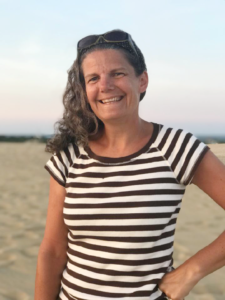 Welcome to Rachel Orr, a longtime literary agent with Prospect Agency. Instead of going with the standard biography here, I’m going to include a few key things she’s said—or others have said about her—that are especially telling.
Welcome to Rachel Orr, a longtime literary agent with Prospect Agency. Instead of going with the standard biography here, I’m going to include a few key things she’s said—or others have said about her—that are especially telling.
- “values her close relationships with authors and believes that nothing feels as good as a fresh, clean line edit.”
- “loves authors who have more than one idea and are willing to revise.”
- “has no spare time—but, if she did, she would spend it dancing, running and reading, of course.”
With that, let’s get to the interview itself to learn more about her. Here we go!
RVC: Let’s start with the here-and-now instead of diving into the deep past. You’ve been agenting for a good while. In all your experience, what has most surprised you?
RKO: I think what has most surprised me most about agenting itself is the close relationships I’ve been able to establish and maintain with my clients.
When I worked as an editor at HarperCollins, I really valued the relationships I had with my authors—and I worried that I would lose that as an agent. However, one agent assured me that I would have even stronger relationships with my clients. After all, an editor may only work with a creator on a single book, but an agent ideally works with a creator over the course of an entire career. That was really exciting to me, and has also turned out to be quite true.
RVC: That’s great to hear!
RKO: I do, however, make sure to respect the author-editor relationship, and feel that part of my role is to place the right author with the right editor. That’s a fun challenge in this ever-changing industry, for sure.
RVC: I’m noticing that you like to use RKO as your initials. Is there a special story or meaning behind that choice? Are you secretly a huge fan of old-school wrestling moves?
RKO: Great question, but not a very exciting answer, I’m afraid. They’re just my initials, and that’s how my name was abbreviated when materials were circed around the editorial department at Harper, so I just got used to it. Plus, I like that there was once an RKO film production company (which produced Citizen Kane, though I’ve never seen it). Kind of cool!
RVC: Fair enough. You’ve been at the Prospect Agency since 2007. What’s special about it, and why’s it such a good fit?
RKO: I love that Prospect Agency is a small agency made up of smart women who care deeply about books and also have a savvy business sense. We get the job done, but I don’t think we present ourselves as intimidating. (I hope not, at least!)
I was fairly intimidated by many agents when I worked at Harper—though there was one agent, Liza Voges, whom I found to be incredibly approachable. She has an amazing roster of talented clients and a solid knowledge of the industry, yet she is so incredibly down-to-earth and makes people feel at east. That’s how I strive to be as well.
I also appreciate the fact that while my colleagues and I will often collaborate and confer on various matters, we have autonomy, too. There’s a lot of trust involved. The president of Prospect, Emily Sylvan Kim, really allowed me to grow the children’s division of the agency when I began, and to start the illustration branch (Prospect Portfolio) from scratch. She always listens to the wild ideas I have for expanding promotion and fostering community, and I’m so grateful for that.
Lastly, what I feel is most special about Prospect is the close-knit feel we’ve been able to establish. My clients consider each other family. I love when I get a photo of my clients helping each other out at a trade show, or simply having coffee together. It warms my agent heart!
RVC: Thanks for the great answer! Now, by reputation, you’re a hands-on, editorial agent. True?
RKO: Yes, absolutely. I’m an editor at heart, and I suppose that’s really the only way I know how to agent.
RVC: Please give me an example of what that looks like.
RKO: Well, it looks a bit different for each client, depending on their needs. With some clients, I might play an editorial hand early on, talking through different possibilities for a new project and then helping to flesh out the characters and plot line. With others, I might not get involved until after they’ve already written a manuscript, and then provide (hopefully) helpful feedback by means of line edits.
RVC: Which has proven more valuable to you as an agent—your work as an editor at HarperCollins Children’s Books, your stint as a Barnes & Noble bookseller, or your time as a student at Kenyon College (where you had cool internships at The Kenyon Review and Highlights for Children)?
RKO: While every experience has helped to shape my career in some way, of course, I’d definitely say that my work as an editor has been the most valuable. On a broad level, it helped me to gain an understanding of how a publishing house operates, which I would not have been able to get otherwise. On a more personal level, it’s where I met so many wonderful mentors—Barbara Lalicki and Rosemary Brosnan, in particular—who were instrumental in my development as an agent. From them, I learned how to write editorial letters—specifically, how to request changes to help improve the story while still honoring the creator’s intention. Also, I was often invited to join them for meals and events with their authors and illustrators, which taught me so much about building these creative relationships. In addition, they placed a lot of trust in me, which helped to firmly establish my own confidence in my work.
RVC: If I spoke with Emily Sylvan Kim (owner of Prospect Agency) or fellow agent Charlotte (Wenger), what would they say is your agenting superpower?
RKO: They might say my knack for carefully reviewing contracts (though that is, admittedly, not my favorite part of my job). Hopefully, they might say planning events (since I’m the one in charge of our retreats and soirée), which is much more fun!
RVC: Just between us, what’s your REAL agenting superpower?
RKO: Maybe diplomacy? (My former boss at Harper used to say that I should have been a diplomat.) Either that or juggling so many different projects and creators. I believe that it’s essential for client care to respond to them as promptly as possible (at least to their emails, even if I can’t get to their manuscript right away) and always make time for phone calls if they need to talk something through. So I try my very best to make that a priority.
But, honestly, the variety of projects and clients is what I love most about my job. I love people, and I love figuring out exactly what each individual client needs in order to thrive. And I love giving feedback on a tender, lyrical middle-grade novel about a girl whose mother struggles with mental illness, and then wracking my brain trying to figure out where to send a poetry collection about animals in pants. It’s what keeps things interesting.
RVC: So, you’re looking for “short, punchy picture books (either in prose or rhyme) that are humorous and have a strong a strong marketing hook.” What are some mentor text examples that’ll give a clear(er) sense of what you mean?
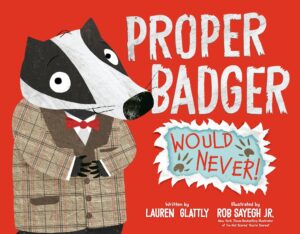 RKO: One example of a humorous picture book in prose that I’m really excited about is Lauren Glattly’s debut Proper Badger Would Never!, forthcoming from Flamingo/PRH on April 2. This was a story that I fell in love with as soon as it hit my inbox. It’s fresh and unexpected and a little bit naughty (okay, a lot bit naughty) with a surprising ending that is far from being sweet and wrapped up in a bow. And while the marketing hook may not be completely clear at first (the way a hook might be if it’s, say, a seasonal title), I do think it could be a fun (and funny) way to open up conversations with kids about manners in terms of what not to do.
RKO: One example of a humorous picture book in prose that I’m really excited about is Lauren Glattly’s debut Proper Badger Would Never!, forthcoming from Flamingo/PRH on April 2. This was a story that I fell in love with as soon as it hit my inbox. It’s fresh and unexpected and a little bit naughty (okay, a lot bit naughty) with a surprising ending that is far from being sweet and wrapped up in a bow. And while the marketing hook may not be completely clear at first (the way a hook might be if it’s, say, a seasonal title), I do think it could be a fun (and funny) way to open up conversations with kids about manners in terms of what not to do.
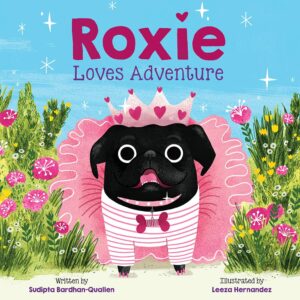 In terms of verse, I would suggest reading anything by Sudipta Bardhan-Quallen, who has an excellent sense of rhyme and meter and is also very intentional about considering marketing hooks. Check out her picture book Roxie Loves Adventure (Abrams) about pugs and love; Chicks Rock! and Chicks Rule! (companion titles, also both from Abrams) about girl power and music and STEM; and the forthcoming Cats in Construction Hats (Random House Books for Young Readers) about construction vehicles and colors.
In terms of verse, I would suggest reading anything by Sudipta Bardhan-Quallen, who has an excellent sense of rhyme and meter and is also very intentional about considering marketing hooks. Check out her picture book Roxie Loves Adventure (Abrams) about pugs and love; Chicks Rock! and Chicks Rule! (companion titles, also both from Abrams) about girl power and music and STEM; and the forthcoming Cats in Construction Hats (Random House Books for Young Readers) about construction vehicles and colors.
RVC: How much do industry trends/marketplace changes affect what you’re looking for?
RKO: I would say that it doesn’t affect what I’m looking for so much so much as it affects when I send a particular project out. For example, if I fall in love with a manuscript about, say, a narwhal, and the market is flooded with narwhal books at the moment, then I’ll ask the writer to send me more manuscripts to consider. Then, if the writer and I decide to work together, then we can keep the narwhal manuscript in our back pocket for when the market would be more favorable. This is why, in my opinion, it’s crucial for writers to have at least five polished manuscripts (preferably in different styles and on different subjects) ready to share when querying agents.
RVC: That’s great advice! In a 2021 Good Story Company interview you did with my buddy, Mary Kole, you talked about how some picture books eventually transform into other formats, like graphic novels.
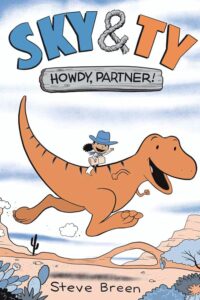 RKO: Yes, it’s something that definitely happens from time to time. Author-illustrator Steve Breen’s young chapter-book graphic-novel Sky and Ty (forthcoming from Pixel + Ink on April 2) was initially conceived as a picture book. The first dummy, however, was about twice the length of a standard picture book. It didn’t have very much text, but it did had have a lot of art and a lot of story that seemed to naturally break into chapters. Given that Steve was already using a limited palette of two colors for the art (along with the fact that he worked as a cartoonist at his day job), it made sense to go in the direction of a graphic novel, especially since the market was so hot for them.
RKO: Yes, it’s something that definitely happens from time to time. Author-illustrator Steve Breen’s young chapter-book graphic-novel Sky and Ty (forthcoming from Pixel + Ink on April 2) was initially conceived as a picture book. The first dummy, however, was about twice the length of a standard picture book. It didn’t have very much text, but it did had have a lot of art and a lot of story that seemed to naturally break into chapters. Given that Steve was already using a limited palette of two colors for the art (along with the fact that he worked as a cartoonist at his day job), it made sense to go in the direction of a graphic novel, especially since the market was so hot for them.
RVC: I don’t think writers fully appreciate this—having a literary agent doesn’t mean guaranteed sales. Sometimes it simply doesn’t work, right? Even when a writer and an agent are 100% onboard with a project.
RKO: Yes, unfortunately, that’s true. (Teardrop!)
RVC: What do you do when that happens?
RKO: Well, I feel that it’s important for the author to keep on writing and for me to keep on supporting that author. It sometimes happens that I might not immediately sell that first manuscript that made me fall in love with the author’s work, but I might sell the second manuscript, and then the third. And then, once the author has established a relationship with an editor, I might be able to go back and sell that first manuscript. (This happened fairly recently, actually.)
Or it might be that we revise the manuscript after getting solid, consistent feedback from editors. We also might decide to shelve the project and pull it out again when the market for that particular genre is better, or when one of us has another idea on how it might be strengthened. Sometimes I might ask one of my illustrators to do a sample that we can submit with it, if we think that might help an editor to better visualize the book. (This strategy once helped to sell a manuscript eight years later!)
In a worse-case scenario, I just pull the manuscript out from time to time, read it again, and weep that it hasn’t sold. (Maybe not really—I’m not a bit weeper—but I’m definitely crying inside!)
RVC: Since we’re talking about things not being what people expect…what do you think is the most common misconception about literary agents?
RKO: I think there’s possibly the misconception that literary agents are scary, which is absolutely true. Joking! We are not scary. And we do not only care about money. (That was one misconception I had when I was an editor, at least.)
My guess is that most of these misconceptions stem from the age when you didn’t necessarily need to have an agent to get a book published. I feel like there were fewer agents then, and those agents primarily focused on the business side of publishing. That’s not necessarily the case today.
RVC: What’s a typical workday look like?
RKO: Well, one aspect of my job that I love is that there is no typical workday. Also, I’ve also had the luxury of working from home (before it was even popular to do so), which gives me the flexibility to mix things up a bit, if need be.
But, in general, I usually start my workday around 8am after my teenage son and daughter have gone off to school. I might begin with work that requires more quiet and focus (since I won’t have a ton of emails to answer just yet)—something like getting back to a client with editorial notes on a manuscript or dummy, or drafting a pitch letter for a submission that I’m planning on sending out that day, or reviewing a contract. At 9am, when emails start coming in, I try to answer them promptly, but thoughtfully (though sometimes they come in quickly and it’s like a game of Whack-a-Mole). Around 10am, I might have a call with a client to discuss the status of a project, or brainstorm ideas for future projects. In the afternoon, if I’m not having lunch with an editor in the city (which is always a treat!), I try to get more work done that requires concentration before my kids get home from school.
Then it’s usually a mad rush of making dinner and picking kids up from their activities and helping with homework (which mostly involves me frantically looking up Khan Academy videos on the slope-intercept form while my son figures it out on his own).
RVC: As a part of two teens, I’ve been there, and I have that URL handy. Here you go!
RKO: Finally, I’ll catch up with more emails in the evening while my husband watches basketball on TV. I realize that doesn’t sound very exciting—but it is, I promise you.
RVC: What’s something that makes it all worth it?
RKO: Absolutely, hands down, the best part of my job is when I have the chance to call a client and share the good news that we’ve received an offer from an editor. It’s most thrilling, of course, if it’s the client’s first book, but even the twenty-first book is really pretty great.
RVC: Totally agree with that! Now, one of your clients, Cori Doerrfeld, had a surprise hit with The Rabbit Listened. What’s the story behind that story?
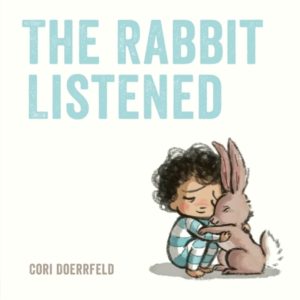 RKO: Well, first off, what I’ve always found to be most surprising is that so many people viewed this book as a surprise. 🙂 True, this was definitely the book that put Cori on the map, so to speak, but she had been illustrating children’s books for nearly a decade by this point. In fact, we had just sent one of her dummies (Good Dog) out on submission the same day I read The Rabbit (as it was called then). It was a Wednesday afternoon in May, and I remember sitting in the reading room of the Hoboken Public Library and thinking, OH! This is good. Often I’ll make a lot of edits before sending a project out, but I made very few tweaks to this dummy (like, maybe only one).
RKO: Well, first off, what I’ve always found to be most surprising is that so many people viewed this book as a surprise. 🙂 True, this was definitely the book that put Cori on the map, so to speak, but she had been illustrating children’s books for nearly a decade by this point. In fact, we had just sent one of her dummies (Good Dog) out on submission the same day I read The Rabbit (as it was called then). It was a Wednesday afternoon in May, and I remember sitting in the reading room of the Hoboken Public Library and thinking, OH! This is good. Often I’ll make a lot of edits before sending a project out, but I made very few tweaks to this dummy (like, maybe only one).
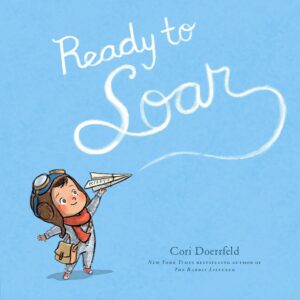 Our only slight hesitation with sending it out immediately was that we had just gone out on submission with Good Dog. We didn’t want editors to feel like they had to choose between the two projects. But then we decided just to go for it! I sent it out late on Thursday afternoon and started getting offers the very next day while I was driving to my family’s house in Pittsburgh. When I stopped halfway for lunch, I called Cori and and gave her an update, and we discussed how we would proceed. Funny—I always imagined big deals going down over a three-martini lunch, rather than in the parking lot of McDonald’s, but that’s exactly how it happened. We sold the book to Kate Harrison at Dial/Penguin Random House. Since then, it has been on The New York Times bestseller list and translated into over 25 languages. Cori’s fourth book with Dial, Ready to Soar, will came out March 12.
Our only slight hesitation with sending it out immediately was that we had just gone out on submission with Good Dog. We didn’t want editors to feel like they had to choose between the two projects. But then we decided just to go for it! I sent it out late on Thursday afternoon and started getting offers the very next day while I was driving to my family’s house in Pittsburgh. When I stopped halfway for lunch, I called Cori and and gave her an update, and we discussed how we would proceed. Funny—I always imagined big deals going down over a three-martini lunch, rather than in the parking lot of McDonald’s, but that’s exactly how it happened. We sold the book to Kate Harrison at Dial/Penguin Random House. Since then, it has been on The New York Times bestseller list and translated into over 25 languages. Cori’s fourth book with Dial, Ready to Soar, will came out March 12.
(Oh, and for the record, we did sell Good Dog as well to Chris Hernandez at HarperCollins. Hurrah! 🙂
RVC: Two more questions for this part of the interview. What was your first special experience with a picture book?
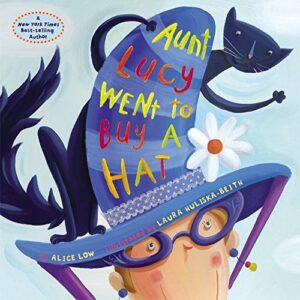 RKO: I would say Aunt Lucy Went to Buy a Hat by Alice Low, illustrated by Laura Huliska-Beith. It was the first picture book that I acquired as an editor at HarperCollins, so it will always hold a special place in my heart (cliché as that sounds!). Laura was especially amazing to work with, and it was fun to see her solve artistic challenges. For example, Aunt Lucy needs to lose her hat in the beginning of the book and then have it by the end, but we
RKO: I would say Aunt Lucy Went to Buy a Hat by Alice Low, illustrated by Laura Huliska-Beith. It was the first picture book that I acquired as an editor at HarperCollins, so it will always hold a special place in my heart (cliché as that sounds!). Laura was especially amazing to work with, and it was fun to see her solve artistic challenges. For example, Aunt Lucy needs to lose her hat in the beginning of the book and then have it by the end, but we 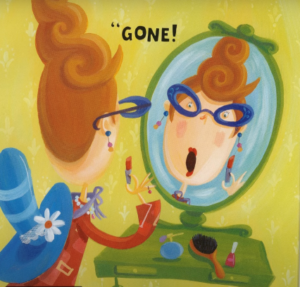 didn’t want it just magically flying behind her on every spread. So Laura came up with the idea to show Aunt Lucy looking in the mirror at the beginning of the book, and she thinks her hat is gone, but it’s really tied around her neck with ribbon and hanging behind her (which the reader can clearly see). It was such a fun solution, and taught me the importance of trusting an illustrator, too.
didn’t want it just magically flying behind her on every spread. So Laura came up with the idea to show Aunt Lucy looking in the mirror at the beginning of the book, and she thinks her hat is gone, but it’s really tied around her neck with ribbon and hanging behind her (which the reader can clearly see). It was such a fun solution, and taught me the importance of trusting an illustrator, too.
RVC: Last question! What are some cool upcoming things you’d like to brag about?
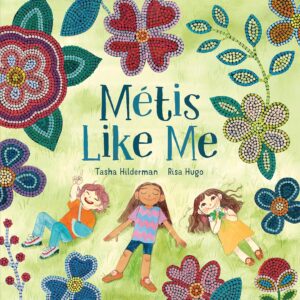 RKO: Oooooo…let’s see! A few upcoming projects that I’m excited about include the picture books Métis Like Me by Tasha Hilderman (Tundra/PRH)—her debut!; My Towering Tree by Janna Matthies (Beach Lane/S&S); I Worked Hard on That by Robyn Wall (S&S Books for Young Readers) and the middle-grade graphic novel Blake Laser by Keith Marantz and Larissa Brown (HarperCollins). Can’t wait!
RKO: Oooooo…let’s see! A few upcoming projects that I’m excited about include the picture books Métis Like Me by Tasha Hilderman (Tundra/PRH)—her debut!; My Towering Tree by Janna Matthies (Beach Lane/S&S); I Worked Hard on That by Robyn Wall (S&S Books for Young Readers) and the middle-grade graphic novel Blake Laser by Keith Marantz and Larissa Brown (HarperCollins). Can’t wait!
RVC: Alright, Rachel. It’s time for the SPEED ROUND. Let’s get zip-zappy fast here with the questions and answers. Are you ready?
RKO: Sure am!
RVC: Which picture book world would you most want to visit?
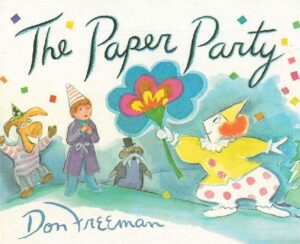 RKO: The Paper Party by Don Freeman.
RKO: The Paper Party by Don Freeman.
RVC: What’s something you think you’re much better at than you actually are?
RKO: Giving interviews?
RVC: What word do you always mispell misppel get wrong?
RKO: brocolli
RVC: Who sets the standard for picture book rhyme?
RKO: Suzy Levinson
RVC: What’s the One That Got Away?
RKO: Gentlemen by Michael Northrop.
RVC: What’s a favorite line from a picture book you repped?
RKO: “…so he can go bite them.”
RVC: Thanks so much, Rachel! This was a hoot!!


What a great interview!